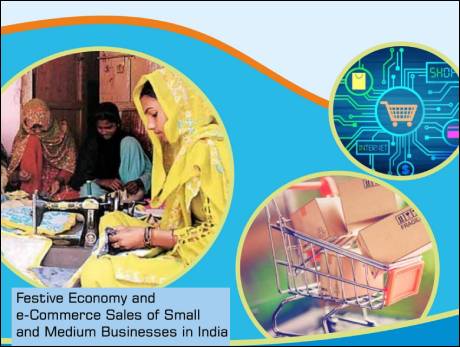
May 16 2022: Amazon and Flipkart were revealed to be the preferred e-commerce platforms of small and medium enterprises in India and they experienced moderate to exponential growth during Covid, finds a study by the CUTS Institute for Regulation & Competition (CIRC.
The research report entitled "Festive Economy and e-Commerce Sales of Small and Medium Businesses in India" aims to assess the role of e-commerce platforms in enhancing the festive sales of Micro, Small and Medium Enterprises (MSMEs) in India and whether the policy landscape in the country is conducive to the growth of e-commerce.
Festive sales play an important role in the Indian economy. In addition to creating communal bonding, festivals also create economic opportunities for businesses, specifically regional MSMEs. The festive economy creates employment opportunities directly as well as indirectly. However, these opportunities were hampered by the lockdown imposed in the wake of the spread of Covid-19. In these times of uncertainty and bleak future, e-commerce offered the much-needed resilience to keep the businesses afloat and a channel to consumers to shop during lockdowns.
CIRC conducted a consumer survey and Key Informant Interviews (KIIs) with small sellers. The research shows that e-commerce is a positive innovation for both consumers and sellers. The consumer survey reported a higher percentage of consumers expressing their preference to shop online during festivals. Similarly, small sellers also reported to have benefitted from e-commerce during festivals and the festive sale events organised by e-commerce companies.
Executive summary
Festivals a create economic opportunities for businesses, specifically regional Medium, Small and Micro Enterprises (MSMEs). The festive economy creates employment opportunities directly as well as indirectly. However, these opportunities were hampered by the lockdown imposed in the wake of the spread of Covid-19. Small sellers, who are reliant on local geographies and seasonal sales, were badly hit by the pandemic, so much so that 35% of small businesses and 37% of self-employed individuals had to shut down their business.
In these times of uncertainty and bleak future, e-commerce offered the much-needed resilience to keep the businesses afloat and a channel to consumers to shop during lockdowns as well as other times without running the risk of exposure to the virus. The e-commerce landscape in India was already flourishing with the increasing internet penetration; however, the pandemic expedited its adoption. As per the estimates of E&Y, the last quarter of 2020 saw the online order volume growing by 36% in India with tier 2 and 3 cities accounting for a 90% incremental volume and value growth in one year. As per the ‘MSME Digital Readiness Survey’ conducted in 2021 to understand how Indian MSMEs have adapted during the pandemic by adopting a digital first approach, MSME saw an increase of 65% in online buying from customers.
14 small sellers were interviewed over the telephone using a semi-structured questionnaire. They were asked about their e-commerce experience in general, during the pandemic and during festivals. They were also questioned about their motivation for on-boarding e-commerce platforms. Amazon and Flipkart were revealed to be the preferred e-commerce platforms as 42% of the surveyed sellers were registered on only these two platforms. As many as 64% of the sellers joined the e-commerce platforms to get access to a wider customer base. Technological evolution and sustaining business during lockdown were other motivations. Sure enough, 42% of respondents experienced moderate to exponential growth, as high as 300 to 500% in sales. However, these figures were substantially hit by the pandemic. Significant increase in sales was reported by 71% of the respondents during the festive season. Handicrafts and home décor items experienced higher sales growth as compared to other commodities. On the policy side, however, 71% of the respondents were not aware of the regulations related to e-commerce, which indicates a need to sensitize the small sellers about e-commerce onboarding as well as the e-commerce policies in India and their rights.
The report concludes with a policy discussion covering the new and proposed regulations governing the e-commerce sector, such as Draft National E-commerce Policy 2019, Consumer Protection Act 2019, Foreign Direct Investment laws and policies, and Personal Data Protection Bill 2019. Based on the broad policy discussion, we recommend the following way forward:
1. The vision of the National E-commerce Policy should be to promote the growth of e[1]commerce by easing entry into the market and reducing the compliance burden.
2. All the laws and policies should go through a consultative process; a framework for continuing constructive dialogue with the stakeholders should also be created. Festive Economy and Online Retail for MSMEs in India
3. The playing field between domestic and foreign e-commerce players should be levelled by applying the same regulations and laws to both.
4. There should be a single set of policies/regulations governing online and offline sellers, bringing in parity.
5. Instead of restricting foreign e-commerce players from letting related parties sell on their platforms, the policy should focus on platform neutrality.
6. The regulatory intervention to micro-manage e-commerce business, such as dictating the type of sale events to be run by e-commerce players, should be avoided.
7. Data should be free flowing across borders, with bare minimum restrictions.
8. There should be more capacity building programmes to educate small sellers on onboarding and using e-commerce. The government and e-commerce players can join hands to carry it out.